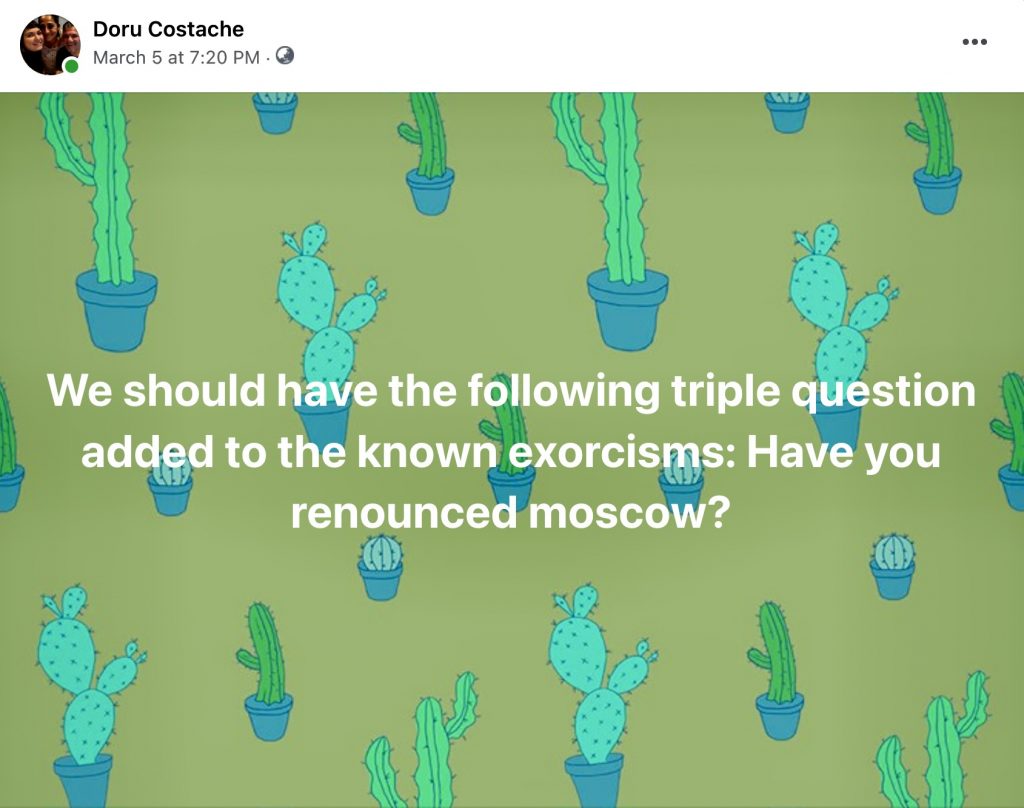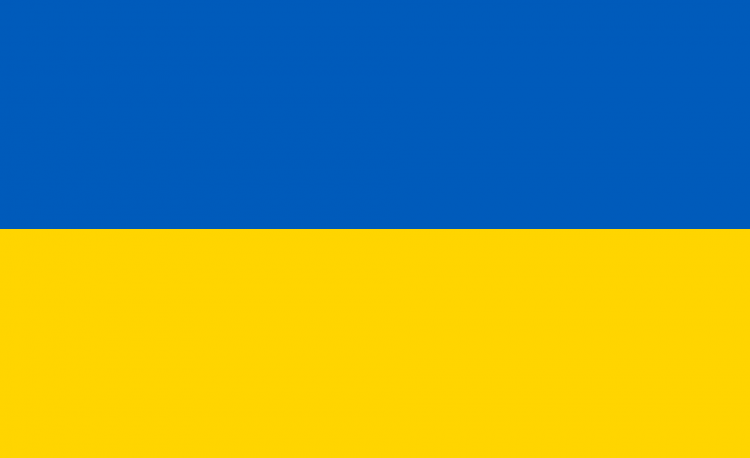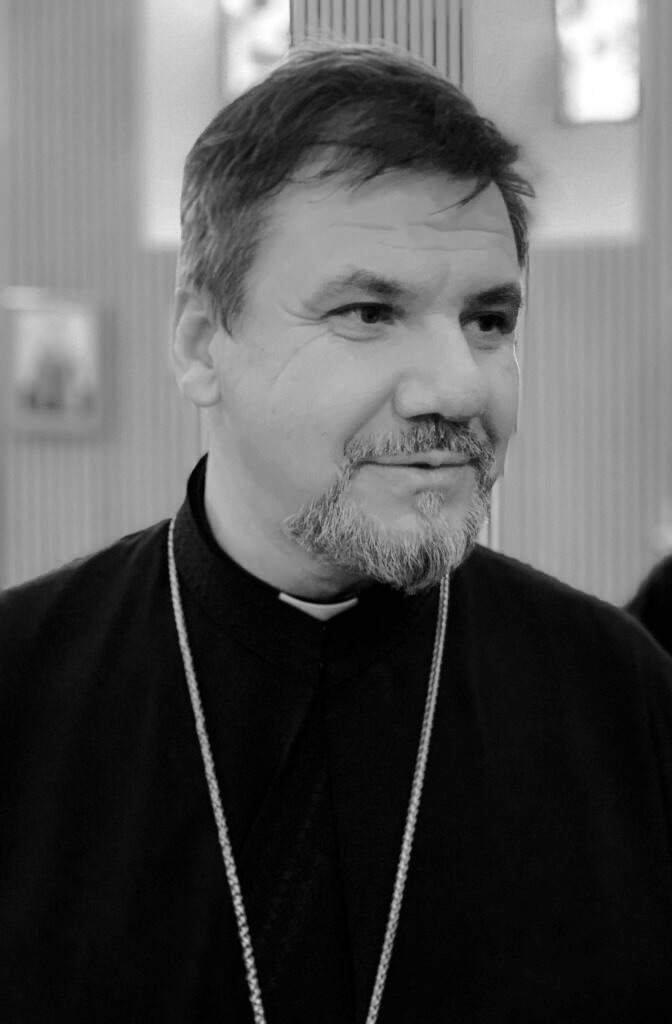While being Australian by adoption, I am Romanian by birth. As such, regarding my blood and the culture that made me who I am, I belong to a nation whose compatriots living in Ukraine have not been kindly treated by the Slavic majority. Ironically, both rulers and ruled are Orthodox Christians. The fact of the matter is that, as a Soviet-era legacy, certain historically Romanian territories inhabited by their original owners are part of modern-day Ukraine. Thank God, however, Ukrainian Romanians, as a Latin-speaking minority, resiliently survive in their ancestral lands, despite the Slavs that engulfed them centuries ago and recently became their rulers. Thank you, Comrade Stalin, and your ideological progeny.
The reader can perhaps understand the strength of the case I wish to make, the compelling plea I am putting forward. Indeed, as Romanian, and as a man proud of his ancestry, upon seeing the current suffering of the Ukrainian people I would have all the reasons in the world to sneer at the turning tables of history. Some of my compatriots living in Romania do just that, though not all, thank God. Just look at the warm hospitality certain Romanian citizens and organisations extend to the Ukrainian refugees, irrespective of the latter’s ethnic and cultural background. For, truth be told, the Ukrainian people is many peoples, of many ethnic and cultural backgrounds. The same goes for the people of Romania and the peoples of Europe, especially those of the eastern and the south-eastern parts of the continent.
And while I am not able to account for the multiethnic and multicultural dimension of other countries, I can for Romania. Here is a mnemonic exercise that helped many Romanians of my generation remember the invaders of our space throughout history, after the collapse of the Roman world. It goes as follows: GoHunGeASlaBulHungPeCuTaTuPolAuRu. This string of syllables enshrines in the memory of Romanians the succession of their invaders and conquerors: Goths, Huns, Gepids, Avars, Slavs, Bulgarians, Hungarians, Pechenegs, Cumans, Tartars, Turks, Poles, Austrians, and Russians. Some of them reached history’s dumpster; rightly so; others still wait for their pay. They all left marks upon the genetic makeup, the language, and the culture of my people.
No matter. Something else is noteworthy, here, namely, the fact that, because of these invaders, like the Ukrainians, modern Romanians are many peoples, not one. They are a rich tapestry of ethnic and cultural backgrounds, woven in the frame of the original mix of Dacian, Roman, Illyrian, Celtic, and Scythian gene pools that founded their formation as a people. And the threads of this tapestry are more diverse than what the above string of syllables encode. At various times in history, other ethnic groups—displaced by vicissitude—sought refuge among the old Romanians, especially in the middle ages. Among these, Albanians, Armenians, Czechs, Germans, Greeks, Jews, Romany people, Russians, and Serbs, that to this day constitute minorities in my country of origin. But my purpose, here, is not to draw the complete map either of past migrations or of recent waves of refugees from farther and unexpected corners of the world. What I must say, however, is that Romanians themselves don’t have a clean track record when it comes to their relationship with these minorities.
And on this note I turn to the point I wish to make: currently, while hell has broken loose on Ukraine, some of my compatriots jubilate, thinking of divine retribution—or historical justice, depending on what they believe in—for Ukraine’s treatment of ethnic Romanians in the Romanian territories it came to control within the Soviet Empire of evil.
 Such a sentiment is perhaps understandable, but only to a point. Never mind how forgetful Romanians are in regard to their own mistreatment of certain minorities, up until recently. What matters are their supposed Christian roots and identity. After all, as certain historians ascertain, Romanians are the only nation on earth begotten, not made, Christian, as their immediate ancestors—that mix of Dacian, Roman, Illyrian, Celtic, and Scythian gene pools—embraced the Gospel before any word in genuine Romanian could be uttered. It is at this juncture that, my being an Orthodox Christian too, I must ask: How could members of a Christian nation—with a significant Orthodox Christian majority and one of the highest rates of church attendance in the Orthodox world—indulge historical, national, and political considerations in the face of the unfolding Ukrainian tragedy? How could the historical injustice done to Romanians by various nations justify their rejoicing at the suffering of Ukrainians?
Such a sentiment is perhaps understandable, but only to a point. Never mind how forgetful Romanians are in regard to their own mistreatment of certain minorities, up until recently. What matters are their supposed Christian roots and identity. After all, as certain historians ascertain, Romanians are the only nation on earth begotten, not made, Christian, as their immediate ancestors—that mix of Dacian, Roman, Illyrian, Celtic, and Scythian gene pools—embraced the Gospel before any word in genuine Romanian could be uttered. It is at this juncture that, my being an Orthodox Christian too, I must ask: How could members of a Christian nation—with a significant Orthodox Christian majority and one of the highest rates of church attendance in the Orthodox world—indulge historical, national, and political considerations in the face of the unfolding Ukrainian tragedy? How could the historical injustice done to Romanians by various nations justify their rejoicing at the suffering of Ukrainians?
There is nothing, nothing in heaven and on earth able to justify genocide. Because this is what the Russians—Orthodox Christians, supposedly—do in Ukraine, genocide. There is nothing, nothing in the Orthodox Christian tradition to justify “holy wars” and the retrieval of real or mythical motherlands at the cost of human lives. As there is nothing, nothing in heaven and on earth to justify the jubilation of certain Romanians at the horrors experienced by the Ukrainian people. Especially when the unfolding genocide occurs at the hands of a Soviet-era KGB dictator and his Orthodox Christian minions—from a Soviet-era “patriarch” down to the ignorant in the streets that bless the “enlightened” rulers and their “holy war”—who enslaved Romania for fifty years in the recent past. And they did the same to other nations in the Balkans and elsewhere, nations equally tempted, as we see these days, to return to censing the idol of their former Russian overlords. But more intriguing for me, as a newcomer to the Anglophone world, is to see identical idolatrous propensities among American and Australian converts to Russian Orthodoxy, who behave as though stoned when it comes to the Russian genocide in Ukraine. And there is nothing, nothing in heaven and on earth to excuse the complicity of these supposed children of the free world in the unfolding tragedy.
The time has come for us, especially Orthodox Christians, Romanian or otherwise—including the improbable yet so real enclaves of “Russian” Orthodox converts of American and Australian origin—to answer the urgent questions: Do we renounce Moscow? Have we renounced Moscow? Because we should renounce Moscow, ecclesiastically and politically, as a natural consequence of the fact of having—at one time or another—renounced satan and its evil and its pomp and its minions. It is only then, when we shall answer these questions truly, in the Gospel’s spirit, that we will be able to see the Ukrainian genocide for what it is, and to do so compassionately, humanly, as Christians would.
6 March 2022 © AIOCS
AIOCS LTD is a not-for-profit charitable organisation that promotes the study of Orthodox Christianity, Eastern and Oriental, in Australia
For donations, please go to https://www.paypal.com/paypalme/aiocsnet or contact us at info@aiocs.net



